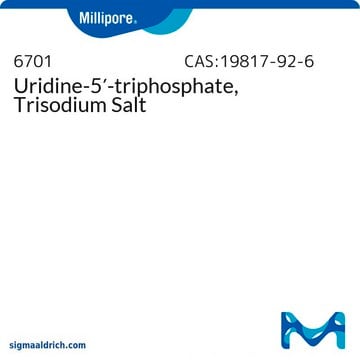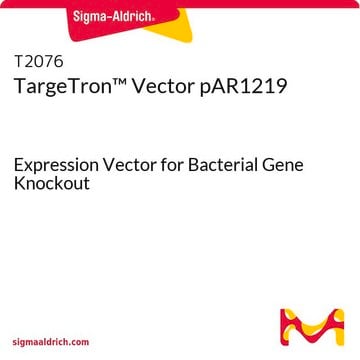U6875
Uridine 5′-triphosphate tris salt
Type VI, ≥90%
Synonym(s):
UTP
About This Item
Recommended Products
type
Type VI
Assay
≥90%
solubility
H2O: soluble 50 mg/mL, clear, colorless
shipped in
dry ice
storage temp.
−20°C
SMILES string
NC(CO)(CO)CO.O[C@H]1[C@@H](O)[C@@H](O[C@@H]1COP(O)(=O)OP(O)(=O)OP(O)(O)=O)N2C=CC(=O)NC2=O
InChI
1S/C9H15N2O15P3.C4H11NO3/c12-5-1-2-11(9(15)10-5)8-7(14)6(13)4(24-8)3-23-28(19,20)26-29(21,22)25-27(16,17)18;5-4(1-6,2-7)3-8/h1-2,4,6-8,13-14H,3H2,(H,19,20)(H,21,22)(H,10,12,15)(H2,16,17,18);6-8H,1-3,5H2/t4-,6-,7-,8-;/m1./s1
InChI key
NHMNWWVJZZPKSL-IAIGYFSYSA-N
Looking for similar products? Visit Product Comparison Guide
Related Categories
Application
- to investigate its activation potential on the purinergic P2Y2 Receptor in THP1 monocytes
- as a component of non-radioactive nucleoside triphosphate solution used in in vitro RNA polymerase assay
- as a P2Y2 agonist in human embryonic kidney cells (HEK293T) in dynamic mass redistribution (DMR) assays
Biochem/physiol Actions
Preparation Note
Storage Class Code
11 - Combustible Solids
WGK
WGK 3
Flash Point(F)
Not applicable
Flash Point(C)
Not applicable
Personal Protective Equipment
Certificates of Analysis (COA)
Search for Certificates of Analysis (COA) by entering the products Lot/Batch Number. Lot and Batch Numbers can be found on a product’s label following the words ‘Lot’ or ‘Batch’.
Already Own This Product?
Find documentation for the products that you have recently purchased in the Document Library.
Customers Also Viewed
Our team of scientists has experience in all areas of research including Life Science, Material Science, Chemical Synthesis, Chromatography, Analytical and many others.
Contact Technical Service











